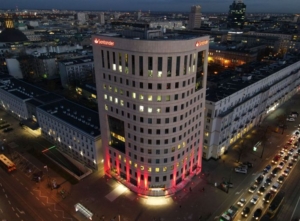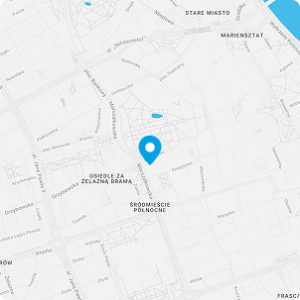1. What made DSV decide to start operating in Poland?
DSV’s roots date back to the second half of the 1970s, when DSV was established in Denmark in 1976 through the merger of nine independent transport companies. The DSV Group has been present in Poland since 1995. Until 2007, it operated under the DFDS Transport brand. In 2001, DFDS Transport became part of DSV Samson. Between 2006 and 2008, acquisitions were made to acquire the Polish branches of the Dutch holding Frans Maas (2006) and the Belgian ABX Logistics (2008). The DSV Group companies in Poland generate annual revenues of over PLN 700 million, placing them jointly among the top five largest and most profitable companies in the TSL industry in Poland. Currently, DSV employs approximately 1,500 people in 25 key locations across Poland.
The key areas of the DSV Group’s operations in Poland align with its corporate organization. They are divided among three divisions: DSV Road (forwarding and road transport), DSV Air & Sea (air and sea forwarding), and DSV Solutions (warehouse logistics). DSV Road provides financial and administrative services to the remaining companies in Poland – a shared service.
2. Scandinavian values in your company – how are they perceived and implemented?
DSV’s vision is to consistently strive to be a leading global operator that meets the needs and expectations of our customers in the field of transport and logistics services, dynamically developing in the market, and leading our industry in terms of profitability. In this way, we aim to set the pace and direction of our development while remaining an attractive business partner for our customers. This applies particularly to all activities related to broadly defined business ethics and ecology. The DSV Group’s activities focus on three core areas: environmental protection, business ethics, and anti-corruption, based on the DSV Code of Conduct, developed for this purpose.
DSV is conscious of its corporate social responsibility. We care about the well-being of our employees and the work environment and ethics. Therefore, we have joined the UN Global Compact initiative, which is based on ten universal principles relating to: human rights, labor standards, the environment, and anti-corruption.
In the field of environmental protection, DSV is taking steps to reduce exhaust emissions into the atmosphere, among other things. Sweden, the first country in the DSV network, plans to reduce CO2 emissions in domestic transport by as much as 90 percent through the use of diesel fuel produced from vegetable oils. In Denmark, meanwhile, DSV has been involved in a historic project since 2012 – the construction of the Copenhagen Metro. Striving to reduce carbon dioxide emissions, DSV is transporting unusual cargo by sea between Sassnitz and Copenhagen during the metro’s construction.
3. How do you see the future not only of the company, but also of the industry in which you operate on the Polish market?
Poland is a large and receptive market, with a good network of road connections and a qualified workforce. Additionally, it has rail connections to the Far East and ports capable of handling even the largest container ships. All this, combined with planned further investments in road infrastructure, gives Poland all the strengths to develop into a distribution center for Western Europe.
Our plans in Poland include further expansion of our existing network, which currently comprises 14 terminals, most of which are located in Class A facilities. To be more efficient, we plan to open two new DSV locations per year in key cities over the next three years. In parallel, we plan to undertake development activities in three areas: IT applications and solutions, human capital, and cooperation with carriers.
We’re unlikely to see revolutionary changes in our industry in the near future. Large global companies are seeking major international logistics operators. Increasingly, the ability to provide high-quality services across Europe, or even globally, is a prerequisite for tendering for transport services. We will continue to see mergers and acquisitions. Currently, the Polish market is highly fragmented. The largest companies have a market share of 4-5%. In about 10 years, the market will be more consolidated, and DSV will be an active player.
4. What benefits does a company gain from SPCC membership?
DSV has been a member of the SPCC since 2004 and is pleased to join the Chamber’s Patrons, seeing this collaboration as an opportunity to present and promote the DSV Group on a platform of entrepreneurs with ties to both Scandinavia and other European regions. We look forward to gaining new contacts, establishing lasting business relationships, and exchanging interesting experiences and knowledge during events organized by the SPCC.


